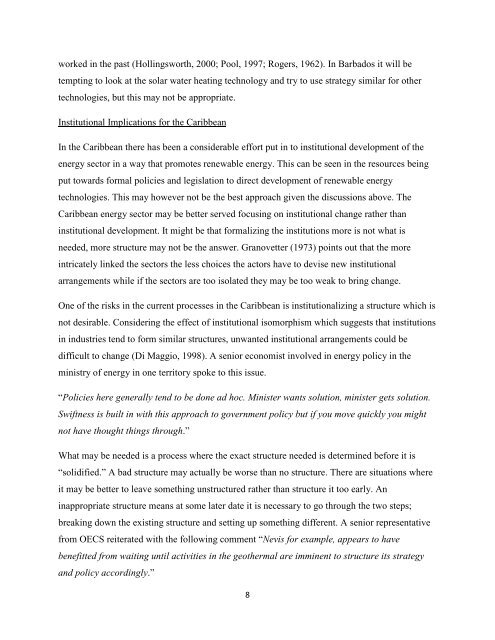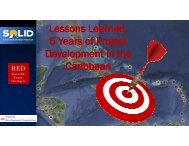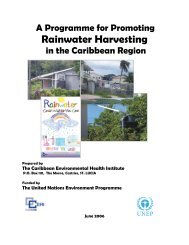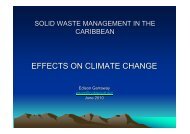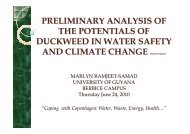David Ince More than Dollars and Cents Why Renewable Energy has ...
David Ince More than Dollars and Cents Why Renewable Energy has ...
David Ince More than Dollars and Cents Why Renewable Energy has ...
You also want an ePaper? Increase the reach of your titles
YUMPU automatically turns print PDFs into web optimized ePapers that Google loves.
worked in the past (Hollingsworth, 2000; Pool, 1997; Rogers, 1962). In Barbados it will betempting to look at the solar water heating technology <strong>and</strong> try to use strategy similar for othertechnologies, but this may not be appropriate.Institutional Implications for the CaribbeanIn the Caribbean there <strong>has</strong> been a considerable effort put in to institutional development of theenergy sector in a way that promotes renewable energy. This can be seen in the resources beingput towards formal policies <strong>and</strong> legislation to direct development of renewable energytechnologies. This may however not be the best approach given the discussions above. TheCaribbean energy sector may be better served focusing on institutional change rather <strong>than</strong>institutional development. It might be that formalizing the institutions more is not what isneeded, more structure may not be the answer. Granovetter (1973) points out that the moreintricately linked the sectors the less choices the actors have to devise new institutionalarrangements while if the sectors are too isolated they may be too weak to bring change.One of the risks in the current processes in the Caribbean is institutionalizing a structure which isnot desirable. Considering the effect of institutional isomorphism which suggests that institutionsin industries tend to form similar structures, unwanted institutional arrangements could bedifficult to change (Di Maggio, 1998). A senior economist involved in energy policy in theministry of energy in one territory spoke to this issue.“Policies here generally tend to be done ad hoc. Minister wants solution, minister gets solution.Swiftness is built in with this approach to government policy but if you move quickly you mightnot have thought things through.”What may be needed is a process where the exact structure needed is determined before it is“solidified.” A bad structure may actually be worse <strong>than</strong> no structure. There are situations whereit may be better to leave something unstructured rather <strong>than</strong> structure it too early. Aninappropriate structure means at some later date it is necessary to go through the two steps;breaking down the existing structure <strong>and</strong> setting up something different. A senior representativefrom OECS reiterated with the following comment “Nevis for example, appears to havebenefitted from waiting until activities in the geothermal are imminent to structure its strategy<strong>and</strong> policy accordingly.”8


